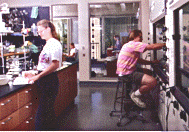 Organic Chemistry
at UCLA is a vigorous and challenging discipline built on great tradition
and dedicated to excellence. The twelve Organic Chemistry faculty members
provide exciting research opportunities in all areas of organic chemistry.
Current
faculty interests include: bioorganic chemistry; conformational analysis
and stereochemistry; catalysis; DNA targeting compounds; natural product
synthesis; molecular recognition; material products; organic electrochemistry;
organic materials science; organometallic chemistry; photochemistry; physical
organic chemistry; polymer chemistry; synthetic methods; synthesis of theoretically
interesting molecules; theoretical organic chemistry; and total synthesis.
Organic Chemistry
at UCLA is a vigorous and challenging discipline built on great tradition
and dedicated to excellence. The twelve Organic Chemistry faculty members
provide exciting research opportunities in all areas of organic chemistry.
Current
faculty interests include: bioorganic chemistry; conformational analysis
and stereochemistry; catalysis; DNA targeting compounds; natural product
synthesis; molecular recognition; material products; organic electrochemistry;
organic materials science; organometallic chemistry; photochemistry; physical
organic chemistry; polymer chemistry; synthetic methods; synthesis of theoretically
interesting molecules; theoretical organic chemistry; and total synthesis.
Today UCLA Organic Chemistry adds to the tradition of excellence established by William Young and Saul Winstein. Don Cram, the first Winstein Professor of Organic Chemistry and now University Professor, received the 1987 Nobel Prize for his pioneering work in host-guest complexation chemistry. More than fifty of Professor Cram's students pursue academic careers worldwide. We also take pride in the success of Bruce Merrifield, the 1985 Nobel Laureate in Chemistry, who received his undergraduate and graduate training at UCLA.
While most of our graduate students are from the U.S., many students from all over the world pursue research in organic chemistry at UCLA. Interaction between the graduate students, postdoctoral scholars and professors is abundant both in chemistry and outside activities. The Thursday evening colloquium provides a lively forum for discussion of the latest chemical research. Overall, the open atmosphere fostered by UCLA Organic Chemistry provides a productive and stimulating learning environment.
The Department of Chemistry and Biochemistry has outstanding staff and instrumentation support for chemistry research. Instrumentation includes 500 MHz, 400 MHz, 360 MHz and 200 MHz NMR spectrometers and a 300 MHz solid state NMR spectrometer. FT-IR, ESR, UV/VIS and four mass spectrometers provide additional spectroscopic tools for organic research. These are complimented by six single crystal and two powder X-ray diffractometers. In addition to the numerous networked microcomputers and workstations in various research groups, the Department has acquired a new departmental parallel multiprocessor and high-performance workstations for general use. Computer users have ready access to the university IBM SP-2 supercomputer and to NSF supercomputing centers around the country. The Chemistry Library, which is crucial to experimental success, is located on the fourth floor of the chemistry building, Young Hall, and subscribes to more than 750 journals and has over 65,000 volumes.
The organic and inorganic research laboratories and instrumentation centers are housed in the spacious new Molecular Sciences Building. Completed in 1993, the building has outstanding research facilities, including many innovative, state-of-the-art health and safety features such as computer controlled hoods, separate graduate student offices, and special distillation rooms. With all laboratories and instruments linked by a computer network, UCLA leads the way in innovative research techniques.
Additional research opportunities arise from collaborations and interdisciplinary research programs within our department and with other departments. Highlighting the importance of the chemistry-biology interface, in particular, is a National Institutes of Health training grant awarded to the Department that provides support for graduate student researchers. Several interdisciplinary research programs within our department are described at the end of this brochure. The Exotic Materials Institute brings together chemists, physicists, and materials scientists. Facilitating interdepartmental programs, the Molecular Biology Institute, the Life Sciences Building, the Department of Materials Science and Engineering, and the UCLA Medical School are all essentially next door to the Department of Chemistry and Biochemistry.
Organic Chemistry at UCLA offers new and exciting research opportunities with distinguished faculty and a large group of superb graduate students of diverse backgrounds to share the challenges and rewards of graduate studies and research.